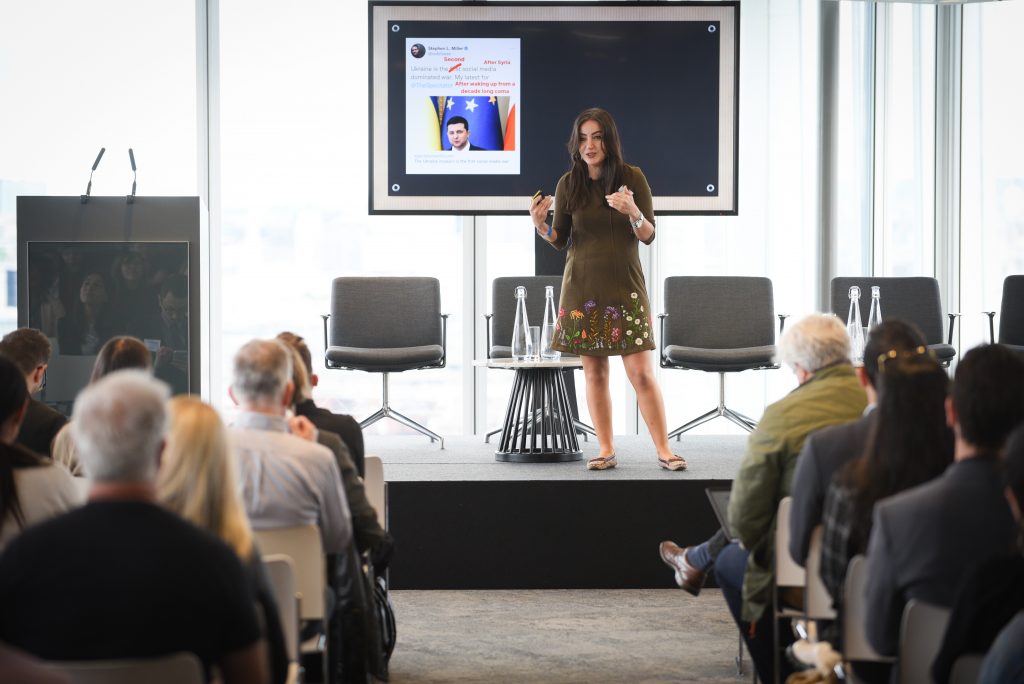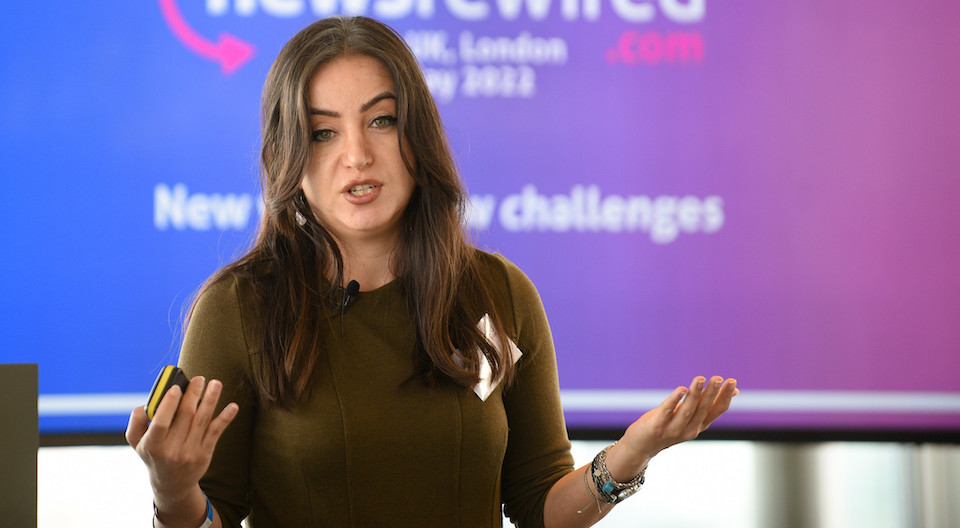By Joseph Ashmenall
Over six years ago, Syrian journalist Zaina Erhaim was living through the Battle of Aleppo, reporting on the horrors of war right on her doorstep.
Erhaim caught the attention of the world with her short documentary series, Syria’s Rebellious Women, focusing on the lives of a group of women in parts of Aleppo.
Erhaim, speaking at Newsrewired today (24 May 2022), believes the war in her homeland, and the local journalists involved in the coverage, have been overlooked and forgotten. It is a lesson worth remembering as our attention is focused on the conflict in Ukraine.
War reporting on social media
The war in Ukraine has been called the first social media dominated war by journalists in the West. Some of Erhaim’s colleagues in the UK were among those making that claim.
“We suddenly started seeing that us Syrians, or those of us in the Middle East, who had been in active war for the last 11 years did not even exist, we were just forgotten,” said Erhaim.
However, Erhaim and her colleagues in Syria used social media to their advantage when reporting.
“I lost more than 20 of my friends who were reporting mainly on Facebook, live streaming on YouTube and on Twitter,” she added.
Double standards in war coverage
The contrast in the reporting of the conflict in Syria and the Middle East to that of the fighting in Ukraine is another issue Erhaim sees.
“When the Ukrainian war started I was pretty much shocked, as someone who has been following the coverage for Syria and the Middle East for a decade, just”When the Ukrainian war started I was pretty much shocked, as someone who has been following the coverage for Syria and the Middle East for a decade, at how sensationalist and passionate the reporting is.”
Erhaim noticed other double standards, including the portrayal of war by journalists, and the glorification of foreign fighters, even down to the language used for the killings of journalists.
Journalists Brent Renaud and Shireen Abu Akleh were both shot and killed whilst covering conflicts. Renaud was shot in Ukraine, with Erhaim pointing out that The New York Times specifically used the word killed, but when it came to Akleh’s death they instead used the verb dying, despite being shot by Israeli forces (now updated).

Journalism in a polarised world
Challenging the polarised world is a key role a journalist can play according to Erhaim. Questioning and addressing self biases and prejudices is essential across the board, however, she suggests supporting humanity and human rights is fair game.
“It makes us journalists who help those who are suppressed and silenced,” she said. “To be fairly reporting you need to be biased to those who are being silenced and attacked.”
The importance of local journalists
Erhaim was a key figure in training journalists during her time covering the fighting within Syria. For her, the roles of local Erhaim was a key figure in training journalists during her time covering the fighting within Syria. For her, the roles of local journalists in the war have gone unnoticed, and are often exploited by international organisations.
“We’re expected to work for free happily in order to be associated with big international (news outlets),” Erhaim said. “You can’t believe how many times I was approached by big media outlets in the UK asking me whether I can give them any ideas.”
She also found that local journalists were often questioned about their professionalism, with their own experiences doubted, and often quoted more than by-lined. By contrast, she claims international journalists are considered “perfect by birth.”
Erhaim offered ten pieces of advice for foreign journalists covering the ‘Global South’:
- Local journalists should not be expected to work for free. They also deserve bylines.
- The security of locals is more important than the story.
- Listen to locals and their stories.
- Ask interviewees “how they are” before hitting record, and make them feel welcome.
- The translator and interviewees might be at risk working with you. Take that into account.
- Remember that you are not the story.
- People do not need journalists to be their voice.
- Help local journalists instead of just quoting them.
- Invest in local journalists, so they can pass on the experience.
- Remember that local journalists and people are experts.
The point is that local journalists are not always objective, that much is hard when you are so close to the story. But their cultural and contextual understanding is crucial to getting the story right, and if you ask for their assistance, you need to recognise their worth.

